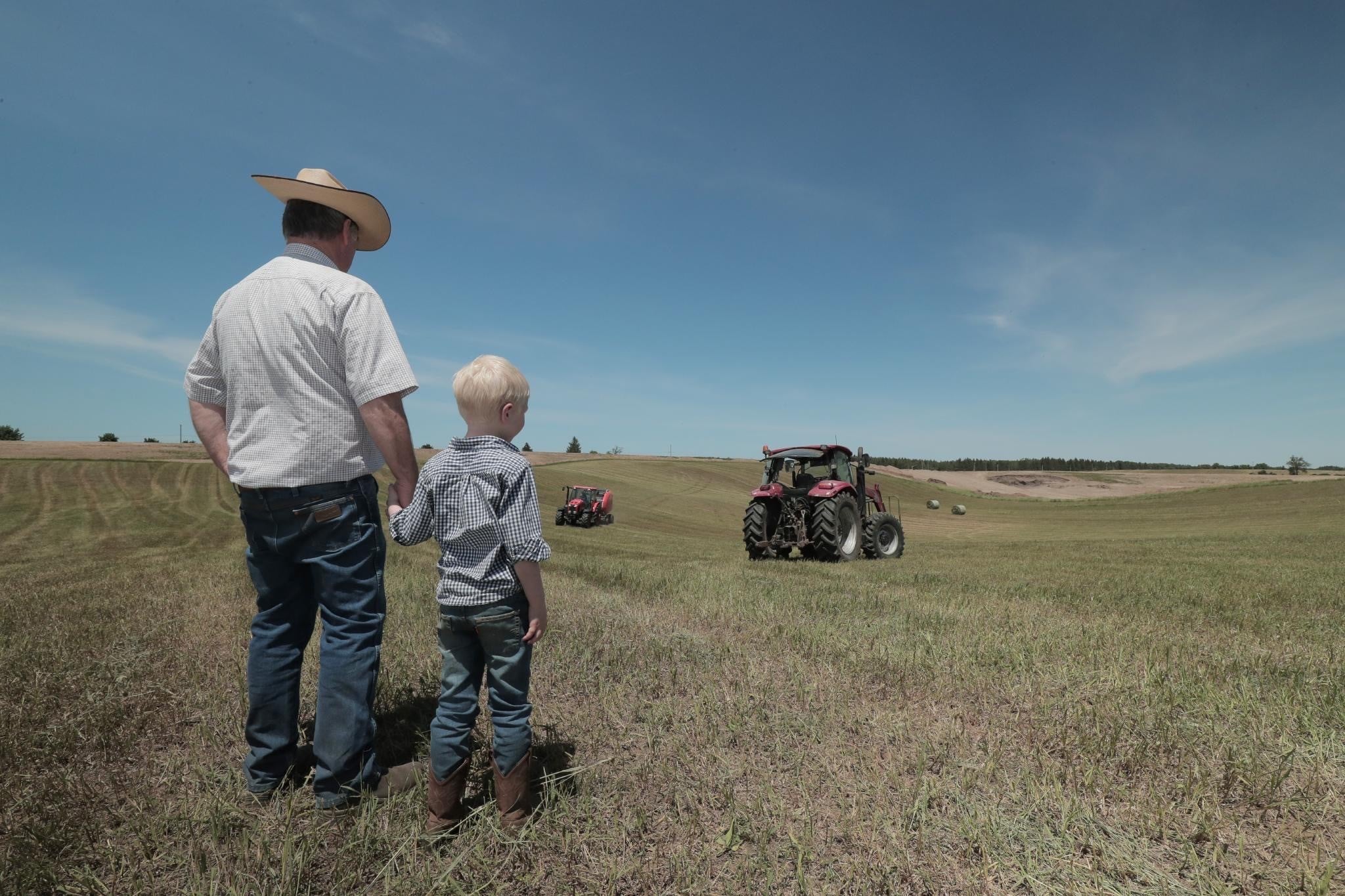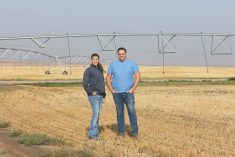As farms get bigger, the challenge of finding workers to cover those extra acres or to help manage those larger herds is getting bigger too, especially when agriculture goes head to head up against more lucrative jobs in other sectors.
Farmers are a bit perplexed, though. I mean, surely anyone would want the life that comes with working on a farm, especially compared to the endless hours of an oil rig, for instance, or to working the midnight shift in a grimy factory or at a job that makes you sweat out the summer in a grungy, dark downtown apartment.
Read Also

Where convention and innovation meet
How one Ontario farm is integrating technology into their beef operation.
Farming offers benefits that other industries can’t, farmers say, such as a chance to be close to nature, to work with a variety of machinery, and to live a healthy life in the open countryside.
That’s what farmers think.
But what do farm workers think?
Every region in Canada has its own industries that compete for workers. In Saskatchewan, it’s the oil and gas sector. So I went to young people in our area, and I asked them, do they agree that farming really offers them a better working environment than the oilpatch?
Even more important, I wanted to know — once they go to the patch, is there any chance of getting them back?
Love of the land
I started with Jesse Bannerman who grew up on a ranch near Livelong, in northwestern Saskatchewan. These days the 25-year-old works as a farrier, he runs 115 commercial cattle with his younger brother, Jake, and he works too on his second cousin’s mixed farm.

Though he’s obviously a busy young man, he’s happy to make time to talk about his experience working in ag and oil.
Earlier in his 20s, Jesse put in several months at Czar Feedyards, south of Wainwright, Alta.
“One of my passions is working with cattle. And I got to work with horses every day, so I really enjoyed that,” Jesse says.
Jesse cites the physicality of agricultural work as a benefit too, and the fact that he was always learning.
“If you enjoy being outside I really recommend it,” Jesse adds. “You get to see lots of scenery. Lots of wildlife, too.”
In other words, Jesse’s thinking and his experiences are exactly in line with what many farmers think: there’s no life like it.
Just a few miles down the road, Jesse’s cousin Chase Bannerman grew up on a seedstock Hereford operation, doing everything from haying to showing cattle through 4-H. Chase, now 20 years old, also clocked nearly two years at One Earth Farms, handling cattle.
Chase counts working with cattle and machinery as benefits that go along with farm work.
“There’s not a whole lot of the farm I don’t enjoy,” says Chase.
And it’s not just the scenery and the job that pulls workers into agriculture. The people themselves can be a draw.
“Everyone who’s involved in agriculture is very passionate about what they’re doing out here,” says 20-year-old Braden Clarke. Braden grew up on a farm seven hours from the Bannermans in the Weyburn area, in southeastern Saskatchewan, and he still calls the area home. In high school, he worked for a neighbouring grain farmer and also did oilfield fencing.
Braden says people in agriculture take pride in their industry. “Everybody has their neck out on the line, and nobody really wants to be just putzing along and have someone out there who doesn’t want to help them better themselves.”
Robert Ellis packed in a lifetime of work experience into his 20s. He spent several summers working on a farm while in university and also added Australian farm work to his resumé.
- More from Country Guide: Help wanted
Robert then jumped to the oilpatch, working as a swabber. Once the pump jacks have been pulled from oil wells, swabbers scavenge two or three barrels a time, up to five times a week. Robert’s boss expanded the business, and Robert bought in. When horizontal wells came in, their mineral rights soared in value, so they sold. And that is how Robert went farming.
Now 32 years old, he farms 6,000 acres near Elrose, Sask. He has three farm employees “and it just seems like more of a family-oriented thing and everybody kind of gets along and tries to get the common goal done at the end of the day.”
In the oilfield, by contrast, “it’s almost like you’re competitive with the next guy standing beside you,” says Robert.
Farm employees also generally work close to home, which isn’t the case for people with camp jobs, Robert says. Plus farm work slows down in the winter, he adds, and often employees get weekends off.
Somebody’s going to pay
Nor is a love of agriculture necessarily enough to keep farm workers on the farm. The oil industry sends living expenses sky high, and Chase says farm employers need to keep up.
Chase knows it’s hard for farmers to keep workers in areas where they’re competing with the oilpatch. “But I think it all comes down to money, really,” he says. “People see opportunities in the oilfield and the money they can get.”
That’s certainly the case with Chase. After nearly two years of working with One Earth Farms, Chase’s uncle offered him a welding apprentice job, doing tank maintenance.
“It was too good an opportunity to pass up,” says Chase.

Chase adds some farmers have side businesses in the oilfield plowing leases, building roads, or towing equipment, and so they employ people for both businesses.
Robert agrees farmers don’t have much choice when it comes to competing with the oil industry for wages.
“Down in our area there’s quite a bit of oil,” says Robert, who adds he pays what he considers big wages to his farm employees. “Wages have definitely gone up a lot for ag workers in the last five years, and they’re going to continue.”
Robert also suggests giving flexible hours when the season’s not busy. “And just trying to be a great boss to work for I think is a lot of it.”
Jesse Bannerman says he would have stuck with the feedlot, but he had cattle at his parents’ ranch, which was a 3.5 hour drive each way. He went to work on the rigs to make some quick cash, then took a job close to home with an oilfield service company
for a while.
In his mind, farmers are dealing with a fraction of the potential workforce.
Whether or not someone is suited to farm work depends on their goals and preferences, says Jesse. “If you like having fancy toys and things you might want to stick to the oilpatch.”
That’s partly why Braden Clarke has been roughnecking for the last two years, and why he’ll be starting a two-year petroleum engineering technology program in Calgary for the fall.
But it’s not just the money that attracted Braden Clarke to the oilfield. “Nobody in my family was ever involved in the oilfield. So for me it was a big venture out. Kind of something that intrigued me.”
Braden’s crew also gets along, which is another plus of his current job. “With the crew I’m working with now, we hang out outside of our shifts.”
Chase enjoys his job, too, and compares it to working in the shop. “You’re actually building things. At the end of the day you can look at what you’ve done and feel you’ve accomplished something.”
Although Jesse eventually left the oilfield, he enjoyed parts of it, too.
“I just didn’t like it as much as farming, but the biggest thing that I had trouble with was to get time off when I needed it just because there’re lots of guys who were farming more than us at the time,” says Jesse. “And everybody takes holidays at the same time. It’s hard for employers to keep everybody happy, which is understandable.”
Jesse suggests farmers keep their employees learning.
“If you’re doing something you haven’t done before you’re a lot more interested in it,” Jesse says. “That’s what I really like.”
Moving to the patch and back
The hidden irony is that the farm is an ideal training ground for the skills needed by oilpatch. The solid work ethic that farming nurtures is sought after too.
Farm work gave Braden the confidence to handle new situations in the oilpatch, he says. And working on machinery helped out in the patch, too.
“You go to work on a rig and the guys are surprised you even know what the tools are called,” says Braden.
But just because a farm worker spends time in the oilfield, that doesn’t mean they’ll become estranged from the farm.
Braden puts in his shift on the rigs, comes home, and puts in another shift on the family farm. And he’s not the only one on his crew.
“One of the guys I work with, he’s now working for a farmer during breakup,” says Braden. He adds it’s common for oil workers to help out either on the family farm or work for farmers during spring breakup.
Chase hasn’t turned his back on agriculture, either. He still works on the family farm and is investing in it, too. A good-paying job speeds him towards his farming goals, he says.
Jesse points out both industries are vital to Saskatchewan’s economy. The oilfield helps keep the small towns going, he says. And he was able to leverage the dollars he earned in the patch into his own operation.
“It’s tough not to have a secondary job, and the oilfield provides a lot of opportunities,” Jesse says.
Robert’s dream was always to farm, and the oilfield helped make that dream happen. He recalls the day, in his early 20s, when his father held an auction sale, marking the end of the family farm.
“That was almost one of the saddest days of my life, thinking that maybe you’ll never get a chance to farm on your own again.”
But then, he got that job in oil and it all turned around.
















